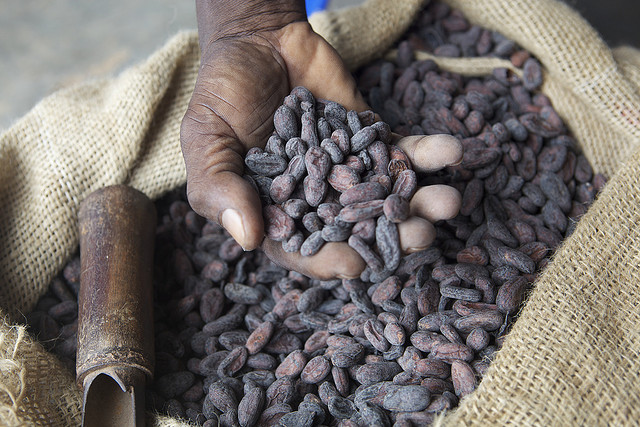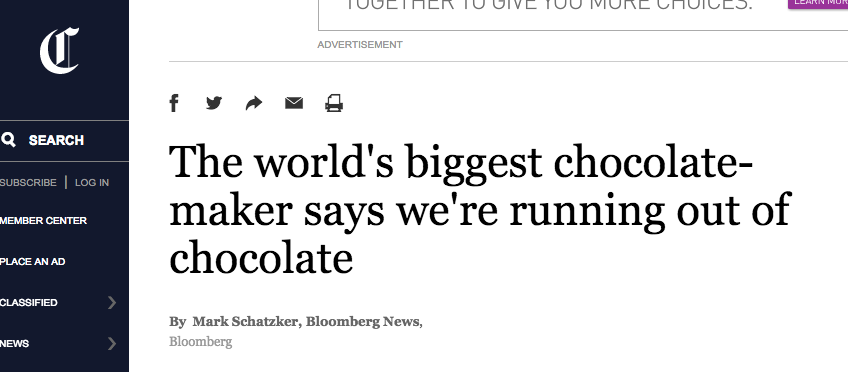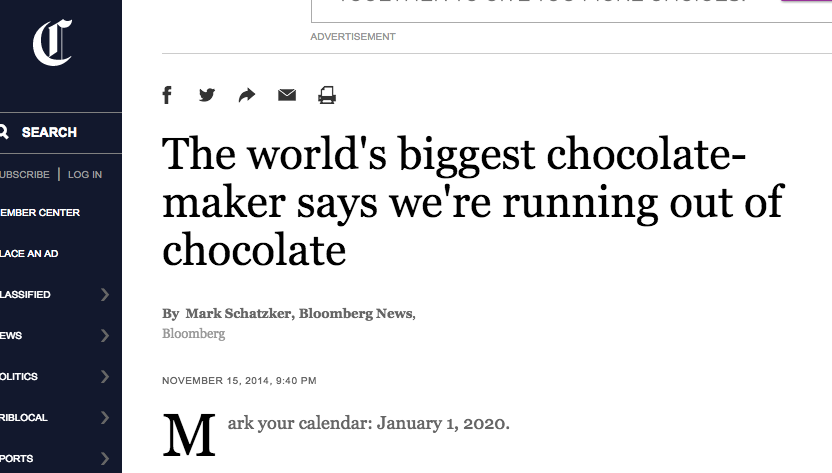Calm Down. The World Isn’t Running Out of Chocolate

A couple days ago my Facebook feed blew up with everyone sharing a Chicago Tribune article predicting a bleak future where our tongues will never again taste the dark, nutty flavors of a slowly melting chocolate bar. That’s right my friends, the world is running out of a chocolate. I know this because the Chicago Tribune says so.
By January 1, 2020 the world will be completely out of chocolate. Start hoarding all those leftover Hershey bars you stole from your kids for Halloween because our dystopian non-chocolate future is impending. Why January 1, 2020? Because, again, the Chicago Tribune said so in its first sentence.
I mean, they don’t exactly say that that is the date we’ll run out of chocolate. In fact, they don’t ever mention that date or year again in the entire article, but since they told us to mark our calendars for that date right after letting us know that we’re running out of chocolate, you can bet I’ll be marking my calendar.
Except…if we run out of chocolate, can’t we just plant more? I mean, we’re not talking about oil or some sort of other nonrenewable resource. Chocolate is made from cocoa beans which we can grow, and perhaps there are bad times ahead in terms of growing cocoa beans, but “running out of chocolate?” Really?
The Chicago Tribune goes on to explain why there may be constraints in the future supply of cocoa.
As this future year unfolds, the gap between how much cocoa the world wants to consume and how much it can produce will swell to 1 million metric tons, according to Mars Inc. and Barry Callebaut, the world’s largest chocolate maker. By 2030, the predicted shortfall will grow to 2 million tons. And so on.
OH DEAR GOD NO!!!! – or umm…did you just say 2030? Didn’t you state in the sentence right before this paragraph that 2020 is the date the chocolate will run out? But now you’re saying there is still chocolate in 2030? How can this be?
Because of disease, drought, rapacious new markets and the displacement of cacao by more-productive crops such as corn and rubber, demand is expected to outstrip supply by an additional 1 million tons every decade for the foreseeable future. Here, now, as you read these words, the world is running out of chocolate.
You keep stating that we’re running out of chocolate, but what you really seem to be saying that farmers are just not growing enough cocoa to satisfy our chocolate cravings because they can make more money growing other crops like corn, a staple food rather than a luxury food. That doesn’t seem like we’re “running out of chocolate” as much as it seems that the price of chocolate is probably too low. If demand is outstripping the supply then the price of chocolate will rise until it becomes profitable to grow again. As the price goes up demand will drop off to match it. So, you’re not so much implying that the world is running out of chocolate but just that we may be facing a future where chocolate is a bit more expensive.
Last year, we again consumed more cocoa than we were able to produce. This year, despite an unexpected bumper crop, supply barely kept pace with the recent upswing in demand. From 1993 to 2007, the price of cocoa averaged $1,465 a ton; during the subsequent six years, the average was $2,736 — an 87 percent increase.
Ok right, so my Econ 101 prediction was correct. We aren’t running out of chocolate. The price of chocolate is just going up. Don’t get me wrong, I love chocolate and don’t want to pay more for it. I don’t want others to have to pay more for it. I would love to live in a world where everyone can get all the chocolate they want and we can spend all day gorging ourselves on chocolate, but if chocolate has to be more expensive my response is merely “meh.” We’re not talking about a staple crop like corn or rice that billions of people depend on for basic nutrients. Chocolate is a luxury item not a necessity.
The Chicago Tribune article goes on to discuss how disease has attacked cocoa plants in South America, leaving Africa to be the main cocoa-growing continent. They briefly touch on climate change, though climate change will affect all agriculture and frankly my worries over climate change and agriculture are more over the stability of staple crops where shortages could lead to mass starvation. Cocoa is low on my list of worries in that area.
They also mention that demand for chocolate is growing as the supply is shrinking. They point out that in 2010 “the Chinese ingested 40,000 tons of cocoa; This year, the country’s appetite will nearly double to 70,000.” Ignoring the fact that a 75% increase is not exactly “nearly double” nor that “ingesting” is a really strange word to use for people eating chocolate, isn’t the fact that the Chinese are eating more chocolate a good thing? As I mentioned earlier, chocolate is a luxury item. The fact that the Chinese are eating more chocolate likely has to do with the fact that they have a growing middle class that can now afford to wonder what is for dessert rather than where their next meal is coming from.
The Chicago Tribune doesn’t outright say it, but certainly makes it sound as though the Chinese are somehow going to steal all our chocolate. Need I remind you again that cocoa is actually a renewable resource that we can grow? Sure there are environmental constraints such as disease, but we’re still not running out. A constrained supply just means that the price will go up. If the price goes up high enough, more farmers will switch over to cocoa in places without the disease or high-tech agriculture companies sensing lots of money to be made will develop disease-resistant varieties of cocoa.
In fact, the rest of the article goes on to discuss some new varieties of cocoa, one of which they lament tastes like “lead and wood shavings; astringent and acidic pulp.” So, a wonderful improvement over the typical Hershey chocolate bar! They do then talk to other scientists about other new varieties that don’t taste like licking a battery. Nowhere do they explain how the world is going to run out of chocolate.
So, should you be hoarding your Hershey’s? Well, hate to break it to you but many of Hershey’s “chocolate” candy has so little cocoa in it that they legally aren’t allowed to call it “chocolate” and hence why they use terms like “chocolate candy,” because using “chocolate” as an adjective rather than a noun obviously does not imply there is actual chocolate in the product.
Ok, so maybe there isn’t so much to worry about here. Chocolate prices may be going up just as they have the last couple years. Low-end candy companies like Hershey will switch to chocolate substitutes and high-end chocolate makers will raise their prices. We certainly aren’t “running out of chocolate” though, so stop worrying and go eat some Ghirardelli’s.
Featured photo from Nestle on Flickr







Paid for by Big Chocolate…Now I’m thinking about a big chocolate bar fighting the Ghostbuster’s Marshmallow Man…smores…
Chocolate’s not disappearing. It’s just getting bad unless you get the expensive stuff. (Seriously, look at how many have replaced cocoa butter with palm oil or partially hydrogenated soybean oil.)
There are, however, other issues with chocolate. Palm oil has deforestation issues and displacement of indigenous peoples in the Indonesian jungles. Cocoa itself has, well, slavery.
Yah, I thought about going into other issues with chocolate and cocoa bean growing but I didn’t have time to do all the research that would be needed for an article like that. It’s not clear to me whether cocoa substitutes are more environmentally friendly or human-rights friendly than growing cocoa beans themselves. Agriculture in general is pretty awful for the environment and often comes hand-in-hand with human rights abuses. But, we can’t just not have agriculture since we need it to feed all the humans in the world. We can survive without chocolate though so maybe chocolate is not the best use of our agriculture. On the other hand, wouldn’t this just increase demand for chocolate substitutes and aren’t those just as bad on all these fronts?
So yah, it’s a bit complicated.
To be fair, there’s always the option of simply doing without.
I also bring up indigenous issues also because most people know little about such things. And it’s hard to place indigenous issues within our traditional understanding of politics, and we’re generally inconvenient, so we’re ignored.
“Failure is not an option!”
Seriously, I agree. People should always take advantage of any opportunity to learn about how their choices and actions affect other people, especially when the other people don’t have equal freedom of action. Thank you for pointing this out.
As we say, mitakuye oyas? (all my relatives).
Dammit, that last letter was supposed to be an i-tilde.
Sigh. So running out is the same as producing tons of it and consuming it, right? Like how the dodo being extinct means that we breed millions of them and eat them all every year?
Those are turkeys. I think… Almost positive that they are not Dodos… ;)
“We certainly aren’t “running out of chocolate” though, so stop worrying and go eat some Ghirardelli’s.”
That sounds remarkably like Marie Antoinette’s infamous “Let them eat cake!”